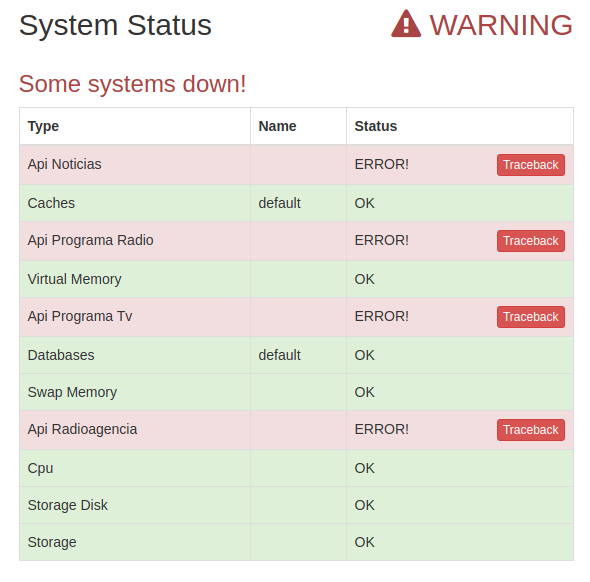Click here to see the English version
O projeto Linguagem Simples (posteriormente renomeado para Plenário Simples) é uma iniciativa do Laboratório Hacker da Câmara dos Deputados para tornar mais fácil a compreensão da rotina dos deputados e das discussões que acontecem no plenário da Câmara, por meio de uma linha do tempo que cobre os eventos que acontecem no plenário da câmara em tempo real. Este repositório contém o código de back-end da plataforma que permite aos jornalistas da Casa inserir novas atualizações na linha do tempo. Além disso, este é um projeto derivado dos levantamentos feitos durante o Nós do Lab , respondendo aos desafios levantados pela sociedade para a gestão de transparência, participação e cidadania do legislativo brasileiro.
É necessário ter intalado os seguintes softwares:
- Docker versão 19.03.6
- Docker-Compose versão 1.25.5
Caso deseje alterar as variáveis de ambiente é necessário alterar as variáveis que estão no docker_compose.yml. É possível alterar as seguintes variáveis:
SECRET_KEY=
DEBUG=
ALLOWED_HOSTS=
HOST=
PORT=
POSTGRES_DB=
POSTGRES_USER=
POSTGRES_PASSWORD=
PGDATA=
DATABASE_ENGINE=- Clone o projeto
git clone https://github.com/labhackercd/linguagem-simples-backend.git- Entre dentro da pasta raiz do projeto
cd linguagem-simples-backend- Execute o comando para iniciar os containers
sudo docker-compose up- Com os contaires(Passo 3) já em execução rode o comando:
sudo docker-compose exec backend sh -c "cd src/ && pytest --cov-report term-missing --cov=apps"- É possível verificar como estão os status do serviço que o projeto Linguagem simples depende no seguinte link:
- Lembrando que é preciso configurar na variável WATCHMAN_TOKENS do arquivo settings.py qual será o token necessário para acessar essa página
A API neste momento já vai estar rodando na porta 8000 do localhost.
Devido a arquitetura escolhida pela equipe (com front e backend desacoplados entre si), e por uma questão de organização, o desenvolvimento deste projeto utilizou a metodologia ágil Scrum, e os documentos gerados podem ser acessados na nossa Wiki
The Linguagem Simples (Plain Language) project (which was later rebranded to Plenário Simples ( Simple Plenary ) is an initiative of the National Congress Of Brazil's Laboratório Hacker ( Hacker Lab ) to make understanding of the day-to-day routine of the representatives and discussions of the brazilian legislative house more accessible to citizens by providing them with an easy-to-understand timeline of events happening in plenary's sessions. This repo contains the back-end code for the platform which allows in-house journalists to update the timeline with content (such as text, image, tweets and so on) that allow for citizens to have a better understanding of the law-making process. This project derives directly from the Nós do Lab event, which engaged multiple sectors of the society to help us disrupt the work processes behind the Brazilian Legislative House with a focus on transparency, participation and citizenship.
In order to run the project via Docker the following software packages need to be installed:
- Docker versão 19.03.6
- Docker-Compose versão 1.25.5
Should you need to change values for environment variables, the following are available in the docker_compose.yml file:
SECRET_KEY=
DEBUG=
ALLOWED_HOSTS=
HOST=
PORT=
POSTGRES_DB=
POSTGRES_USER=
POSTGRES_PASSWORD=
PGDATA=
DATABASE_ENGINE=- Clone this repo
git clone https://github.com/labhackercd/linguagem-simples-backend.git- Enter the project's root directory
cd linguagem-simples-backend- Start up the docker instance
docker-compose up- To run the development version, run the following command
docker-compose up devHow to run tests.
- run the following command when the Docker container is already up:
sudo docker-compose exec backend sh -c "cd src/ && pytest --cov-report term-missing --cov=apps"-
It is possible to verify the status of services the Linguagem Simples' project relies upon by navigating to the following link:
- Just a reminder that it is necessary to inform the token needed to access the page by changing the WATCHMAN_TOKENS variable of the settings.py file
Due to the decoupled architecture chosen by team (with separate repositories for back and front-end code) and to the use of the SCRUM agile methodology, the documentation of this project happened in our Wiki


